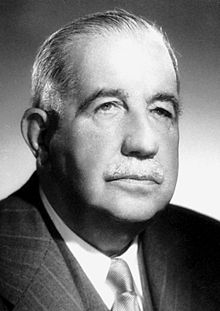Léon Jouhaux
This article needs additional citations for verification. (June 2022) |
Léon Jouhaux | |
|---|---|
 | |
| Born | 1 July 1879 Pantin, France |
| Died | 28 April 1954 (aged 74) Paris, France |
| Resting place | Père Lachaise Cemetery |
| Spouses |
|
| Parent |
|
| Awards | |
Léon Jouhaux (1 July 1879 – 28 April 1954) was a French trade union leader who received the Nobel Peace Prize in 1951.[1]
Biography
Jouhaux was born in
In 1906, he was elected by the local union as a representative to the

In the years before
After the war, Jouhaux split from the CGT to form the social-democrat
In an international context, his work was instrumental in the setting up of the International Labour Organization (ILO), and was elected to high positions in international trade union bodies, including the International Federation of Trade Unions and its postwar kin the World Federation of Trade Unions until that body split.
After his death in 1954, Léon Jouhaux was interred in
Legacy
- The rue Léon Jouhaux in Aix-en-Provence, Grenoble, Lyon, Genas, Villefranche-sur-Saône and Paris are named for him.[2][3][4][5][6][7]
Quotation
"I would not go so far as to say that the French trade unions attached greater importance to the struggle for peace than the others did; but they certainly seemed to take it more to heart." Léon Jouhaux[8]
References
External links
- Léon Jouhaux on Nobelprize.org including the Nobel Lecture, December 11, 1951 Fifty Years of Trade-Union Activity in Behalf of Peace
